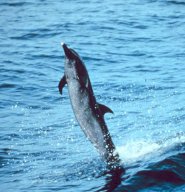Thursday 29 July 2010 The Pantropical Spotted Dolphin - Yellow Fin Tuna's Best Friend
 The pantropical spotted dolphin (Stenella attenuata) is a species of dolphin in the genus Stenella and is one of the more distinctive species of dolphin in the world's oceans. When the pantropical spotted dolphin is born it can be hard to distinguish it from its cousin the common bottlenose dolphin as they are without spots. The dolphin acquires spots as it matures until the body is eventually covered with overlapping patterns of spots. When the pantropical spotted dolphin reaches maturity the body has a distinct black "cape" down its back with gray along the sides and a white underbelly. The pantropical spotted dolphin, like many of the other species in the Stenella genus, is a smaller dolphin. The average dolphin grows to between 1.5-2 meters (6-7ft) in length and weighs around 114 kg (250lbs).
The pantropical spotted dolphin (Stenella attenuata) is a species of dolphin in the genus Stenella and is one of the more distinctive species of dolphin in the world's oceans. When the pantropical spotted dolphin is born it can be hard to distinguish it from its cousin the common bottlenose dolphin as they are without spots. The dolphin acquires spots as it matures until the body is eventually covered with overlapping patterns of spots. When the pantropical spotted dolphin reaches maturity the body has a distinct black "cape" down its back with gray along the sides and a white underbelly. The pantropical spotted dolphin, like many of the other species in the Stenella genus, is a smaller dolphin. The average dolphin grows to between 1.5-2 meters (6-7ft) in length and weighs around 114 kg (250lbs).It is possible to mistake the pantropical spotted dolphin with the coastal spotted dolphin and Atlantic spotted dolphin. However, the coastal dolphin is a subspecies of the pantropical spotted dolphin while the Atlantic dolphin is a different species in the Stenella genus. It is often hard to differentiate between the varieties as their coloration is very similar, but the pantropical spotted dolphin is often slightly smaller at full maturity and is found in a wider stretch of ocean.
The pantropical spotted dolphin is found in tropical and sub-tropical oceans and waterways across the globe. Their distribution can vary widely with some stocks occurring in and around the Hawaiian Islands, while others are found in large numbers far at sea in the Eastern Pacific Ocean. During the daytime hours spotted dolphins can be found in shallow waters with depths between 90-300 m (300 to 1,000 ft), but dive into deeper water at night in search of food. The dolphin feeds on a variety of creatures including fish, such as mackerel and flying fish, squid, and shrimp.
The pantropical spotted dolphin is unique for its unexplained association with yellow fin tuna. In fact, the species gained international notoriety in the late 1970s and 1980s as the species was pushed to the brink of annihilation due to their association with the yellow fin tuna. As fishermen around the globe used purse-seine nets to trap the tuna, they would trap the dolphins in their nets as well, leading to suffocation of the dolphins. An intense focus on dolphin-safe tuna fishing standards in the United States has helped bring the pantropical spotted dolphins' numbers back up, but its association with the yellow fin tuna and questionable fishing habits by mankind remain the biggest threats to the pantropical spotted dolphin. You can help spreading the word about this animal by liking it on facebook
